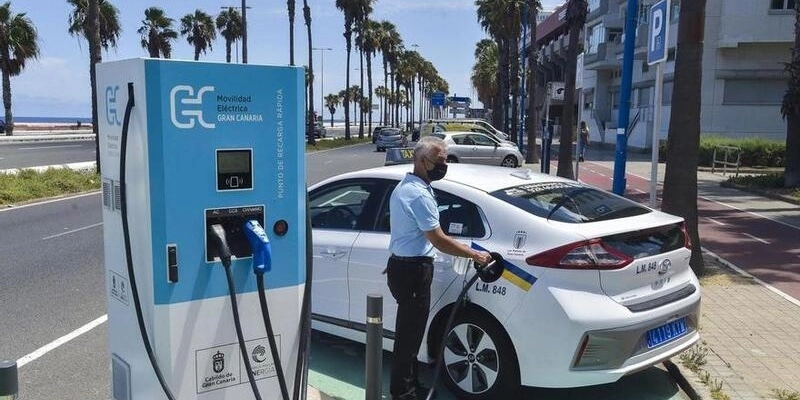While in the rest of Spain, the general Value Added Tax (VAT) is 21 per cent, in the Canary Islands, the Canary Islands General Indirect Tax (IGIC) has a general rate of 7 per cent.
Since 2019, electric cars were exempt from this rate, meaning the tax rate was reduced to 0 per cent.
In this context, some residents of the region have adopted a purchasing strategy to maximize their savings.
It is important to note that, in certain cases, this tax exemption could be contributing to some local dealers not being as competitive in terms of price as one might expect.
This has led many residents to choose to purchase cars on the mainland and, once they arrive in the Canary Islands, request a refund of the 21 per cent VAT at customs.

Arturo Lang-Lenton Villalobos, founding partner of icanCharge!, explains Mobility Portal España:
“Many Canarians, including taxi drivers, have done so after seeing that the difference in the acquisition cost was between 4,000 and 9,000 euros for the same vehicle.”
In any case, this policy has placed the Islands in a prominent position with regard to the adoption of electric cars.
Specifically, it ranks fifth among regions with the highest monthly penetration of zero and low emission cars in Spain, after Madrid, Catalonia, the Valencian Community and Andalusia, with 2,653 registrations in 2024.
This is why Lang-Lenton Villalobos wonders what prevents this measure from being replicated in the rest of the country.
And it’s not the only one.
The Spanish Association of Automobile and Truck Manufacturers (ANFAC) is calling for a similar reduction in VAT for electric cars, but so far, these requests have not materialized.
Meanwhile, the Canary Islands Government has firmly supported this measure, with the aim that, by 2030, 50 per cent of the cars circulating on the islands’ roads will be hybrid or fully electric.
This location is the ideal setting for electric mobility due to its relatively short distances.
“Travelling the entire perimeter of the island of Gran Canaria is equivalent to approximately 180 kilometres,” explains the founding partner of icanCharge!.
The experience of the Canary Islands with the reduction of IGIC to 0 per cent highlights the need for a more accessible tax policy at national level.
Especially considering that this strategy is aligned with the CO2 emissions reduction targets set by Europe.
It also offers an effective solution to promote the use of alternative cars without the need to impose bans.
Other European countries, such as Norway, where zero-emission car penetration is 82 per cent, have implemented direct incentives such as the elimination of VAT.
In Spain, this deduction would represent a more direct and buyer-focused alternative compared to the Moves Plan, whose extension until December 31, 2024 has been the subject of much discussion.
Why? Because aid has been extended and the budget increased, but the demands of the sector have not been taken into account.
According to an electromobility specialist who spoke to Mobility Portal España, this measure constitutes “a hasty response to a context that has been demanding action for some time.”
The truth is that both users and the private sector were not only expecting an extension of the aid programme, but also an improvement in its bases and conditions.
In this context, the elimination of VAT on these vehicles would be a win-win, as it is easy to implement and directly benefits the user, provided that regulations are established to avoid price increases by manufacturers and dealers.
Transport&Environment also proposes an alternative, which consists of governments applying taxation in accordance with the principle of “the polluter pays”.
These measures would accompany the aid with improvements in VAT, corporate tax and registration tax, with the aim of making electric cars accessible to all budgets.
The reduction in the rate or a deduction in it could even be complemented by MOVES.








